SUMMARY
This is AI generated summarization, which may have errors. For context, always refer to the full article.
- North Korea threatens US bases in Japan, Guam
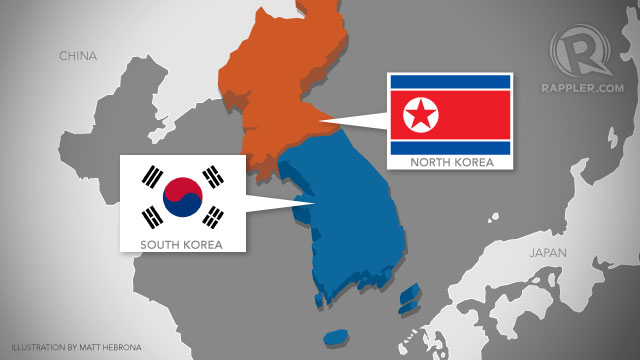
The North Korean army on Thursday, March 21, threatened a possible strike against US military bases in Japan, in response to the use of nuclear-capable US B-52 bombers in joint military drills with South Korea. The threat came a day after Pyongyang condemned the B-52 flights as an “unpardonable provocation” and threatened military action if they continue. The Pentagon confirmed that B-52s, taking off from Andersen Air Force base in Guam, had flown over South Korea as part of annual joint exercises that Pyongyang insist are a rehearsal for invasion. “We cannot tolerate the US carrying out nuclear strike drills, setting us as targets, and advertising them as strong warning messages,” a spokesman for the North’s supreme army command said.
Read the full story on Rappler. - South Korea recovers after cyber attack
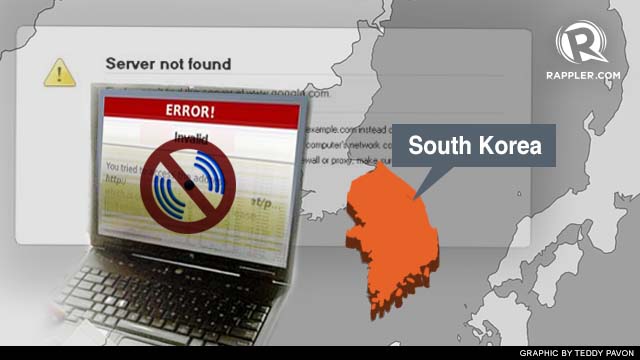
Following a concerted cyberattack on the computer systems of a number of South Korean broadcasting stations and banks, the Yonhap News Agency is reporting that the affected companies have recovered their networks, though there is still work to be done on fixing individual computers and gadgets. While South Korean officials have found that the malicious code originated from an IP address in China, the identity of the hackers involved could not be confirmed.
Read more on Rappler:
South Korea recovers from cyber attack
South Korea tracks cyber attack to China IP address - US is committed to Israeli security
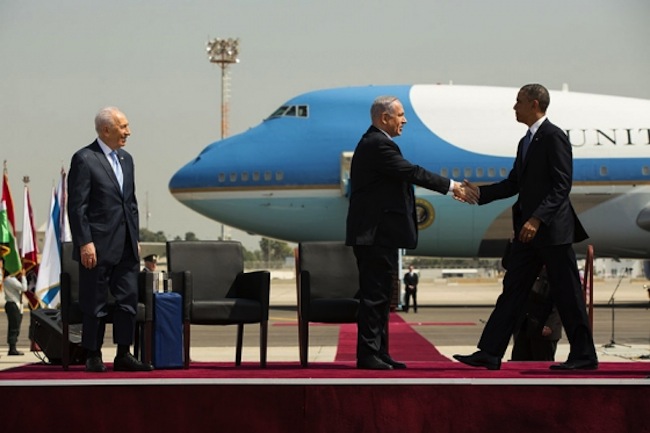
On his first visit to Israel as president, US President Barack Obama told a joint press conference with Israeli Prime Minister Benjamin Netanyahu, “America’s commitment to the security of the state of Israel is a solemn obligation.” Both leaders also agreed that Israel had the right to “defend itself” and that they have a “common assessment” of the Iranian threat. Netanyahu said he was convinced Obama was determined to prevent Iran from becoming a nuclear-armed state. On Syria, Netanyahu said they agreed it was important to prevent the country’s chemical weapons from falling into “terrorist hands.”
Read the full story in the Washington Post.
More details are on Rappler. - Police search IMF chief Lagarde’s home
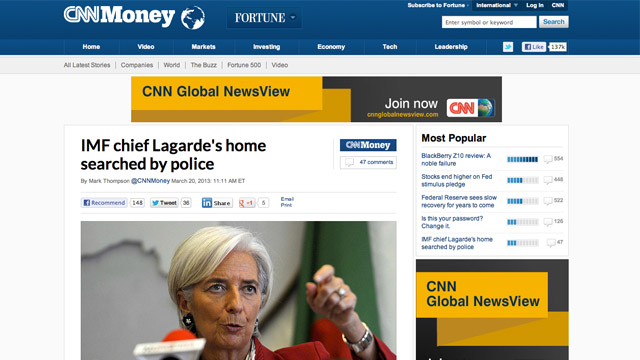
French police investigating the role of IMF chief Christine Lagarde in settling a dispute when she was still finance minister have searched her Paris home. The dispute involved French bank Credit Lyonnais and businessman Bernard Tapie who supported former French president Nicolas Sarkozy. Lagarde, who has been accused of giving him preferential treatment, has denied any wrongdoing. A French court in August 2011 said it was probing Lagarde’s alleged intervention in the dispute. She was appointed IMF managing director in June 2011 after her predecessor Dominique Strauss-Kahn resigned over charged of sexual assault in New York. IMF spokesman Gerry Rice said that prior to the choice of Lagarde, the executive board had expressed confidence she would be able to “effectively carry out her duties.”
Read the full story on CNN. - Australia formally apologizes for forced adoptions
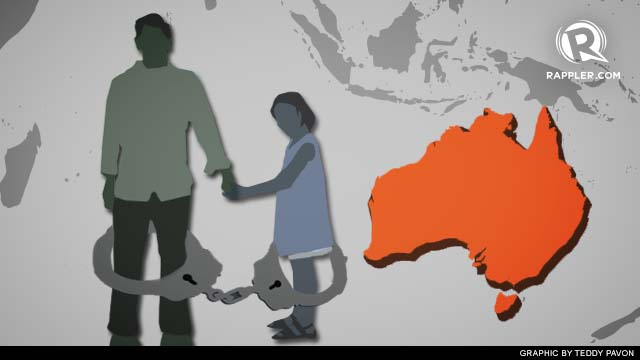
Australia on Thursday, March 21, apologized for the brutal and often illegal forced adoption of tens of thousands of babies born mostly to unmarried mothers between the 1950s and 1970s. The adoptions, driven largely by religious groups in the post-war period, “created a lifelong legacy of pain and suffering,” the national apology delivered by Prime Minister Julia Gillard said. “To you, the mothers who were betrayed by a system that gave you no choice and subjected you to manipulation, mistreatment and malpractice, we apologize,” she said to applause from 800 people affected by the policy.
Read the full story on Rappler - Bailout plan to be presented Thursday

After banks were shut down all week to prevent mass withdrawals, the President of Cyprus is expected to present a “Plan B” to political leaders this Thursday. This is after parliament rejected on Tuesday a bank levy imposed as a condition by the European Union and the International Monetary Fund for a 10-B euro bailout. The plan might include a tax on bank deposits over 100,000 euros, and may include some Russian help. Russians are said to hold between a third and a half of all Cypriot deposits, attracted by the low tax rates of Cyprus. Banks in Cyprus were exposed after the debt crisis in Greece, and there are fears Cyprus could go bankrupt of these banks fail.
Read the full story on the BBC - Pope confirms he will attend World Youth Day
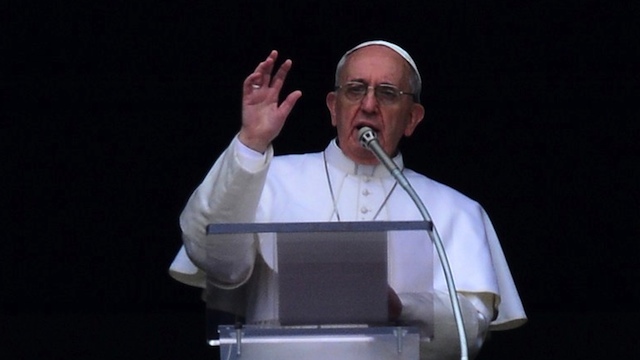
Pope Francis on Wednesday confirmed that he would attend a Catholic youth festival in Rio in July, Brazilian President Dilma Rousseff said after meeting the Argentine pontiff at the Vatican. The newly-inaugurated pontiff said he expects a “large presence of young people” at World Youth Day due to take place July 23-28, she told Brazilian reporters after the 30-minute meeting. Organizers expect two million young faithful to flock to Rio for the event. It will be the second time the gathering is held in Latin America, after the Buenos Aires event in 1987.
Read the full story on Rappler. - Aquino signs law ‘revitalizing’ PTV-4

President Benigno S. Aquino III signed into law a measure that will “revitalize” the operations of state-owned and -operated television station People’s Television Network Inc or PTV-4. “I am happy to announce that President Aquino signed into law Republic Act 10390, an Act Revitalizing the People’s Television Network, on March 14,” Communications Secretary Herminio Coloma, Jr. said in a Malacañang press conference on Wednesday, March 20. RA No. 103901 amends RA No. 7306 and is called “An Act Providing for the Establishment of the People’s Television Network, Incorporated, Defining Its Powers and Functions, Providing for Its Sources of Funding and for Other Purposes.”
Read the full story on Rappler - Voyager still inside solar system, says NASA
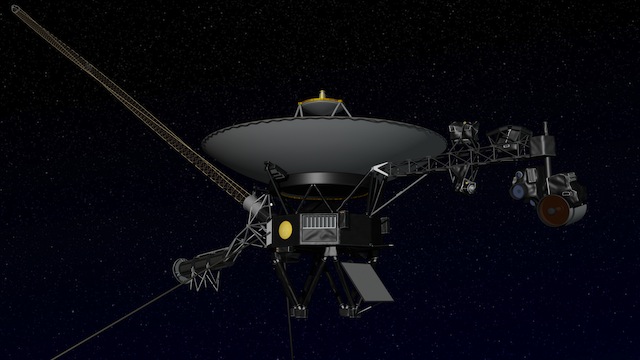
The US space agency on Wednesday, March 20, denied a claim made in a scientific study that its Voyager 1 spacecraft had left the solar system, describing the report as “premature.” Scientists are eagerly awaiting signs that the craft, which was launched in 1977 on a mission to study planets, has become the first man-made object to leave the boundaries of our solar system. “The Voyager team is aware of reports today that NASA’s Voyager 1 has left the solar system,” said Edward Stone, Voyager project scientist based at the California Institute of Technology, Pasadena, California. “It is the consensus of the Voyager science team that Voyager 1 has not yet left the solar system or reached interstellar space,” he said.
Read the full story on Rappler - US will stay out of Sabah issue

The United States will stay out of the Sabah dispute despite claims that Washington is bound to protect the Sulu Sultanate under a century-old treaty. “We’re not looking to respond in any matter to the invocation of the treaty,” US Ambassador to the Philippines Harry Thomas said during the annual Kapihan sa Embahada informal meeting with defense reporters on Wednesday, March 21. Thomas explained that “we do not see this as a matter that affects the United States or the Philippines-US Mutual Defense Treaty” regardless of any treaty signed almost a hundred years ago. He added, “We have confidence in President Aquino and Prime Minister Najib’s ability to resolve this issue peacefully.”
Read the full story on Rappler
Add a comment
How does this make you feel?
There are no comments yet. Add your comment to start the conversation.